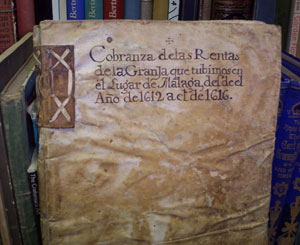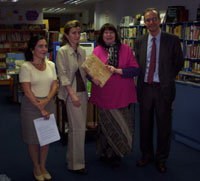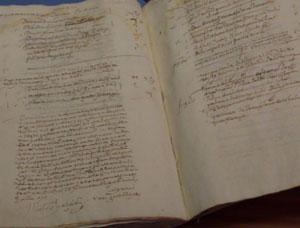news, events, calendar, churches, schools
![]()
A 17th CENTURY SPANISH MANUSCRIPT
FOUND AT AI BOOK SHOP
The book will help research about life in Spain after the Christian
Reconquest.
Related links
 Rent book recording annual payments for land rental made by farmers in Malaga between 1612 and 1616 
Handing over: Esther Cruces, Carolyn Garmendias, Mary Wright and Martinez Corrcher, from the Cultural Office of the Spanish Embassy  One of the few records of how private farmers worked in the XVII Century in Spain Amnesty International Book Shop 139b King Street Hammersmith London W6 020 8746 3172 Sign up for our free weekly newsletter Comment on this story on the forum |
People
accumulate stuff in their lofts and storage rooms; sometimes things
left by their parents, grandparents or who knows whose family's
past generations. Then there is that cleaning day when everything
goes to a charity shop. The last season clothes, old house ware,
maybe that peace of furniture forgotten in some corner of the house…
All useless stuff, one might think. But among those "meaningless"
books left at the Amnesty International Book Shop in Hammersmith
not so long ago, there was a 17th Century Spanish manuscript. "It is an important peace of our history", said Esther Cruces, director of the Malaga Historical Archive, who came from Spain last Friday specially to receive the book from Mary Wright, AI Book Shop co-ordinator. It is much more than a 400 year-old handwritten book, according to Mrs Cruces. By the end of the XV Century, the Catholic Monarchs, Isabel and Fernando, completed the Christian Reconquest by taking Granada from the last Muslim domain in Spain. After that, Muslims and Jews were expelled and life in South of Spain went through several changes. The book found is a record of how private properties and farmers worked in South of Spain after the Reconquest (718-1492). The Malaga Historical Archive itself holds only a few of its kind and this manuscript will now help on the research about that moment of transition in the Spanish history. No wonder why volunteers at the AI Shop found the book unusual when they saw it: a rent book recording annual payments for land rental made by farmers in Malaga to an unknown landlord between 1612 and 1616; 150 pages long, bound in parchment with leather hinges and in a very good condition. Carolyn Garmendias, a Spanish archivist, was called in to check it out. Mrs Garmendias was impressed with its content. For example, payments were made not in cash, but in "fanegas" of wheat (and believe it or not, this type of measurement still survives in parts of Spain). Most payments were between 7 to 20 fanegas, but the highest is 45, which must have been for a very substantial farmland. One farmer also paid rental for an ox to pull his plough. It was time for this antiquarian rarity made a virtual travel through an archivist forum on the Internet and within days the Malaga Historical Archive claimed ownership. Back in real time, Mrs Wright keeps wondering who left the manuscript at the AI Book Shop and would like to hear from him or her, although no compensation is been offered, not even in fanegas of wheat. |